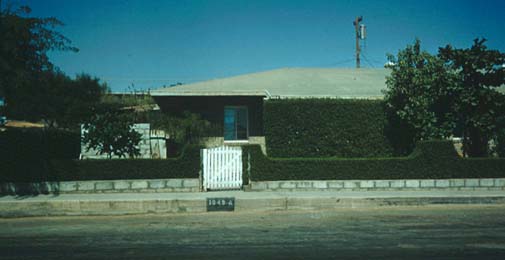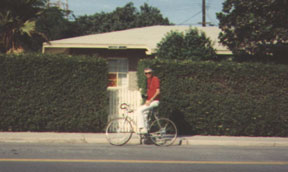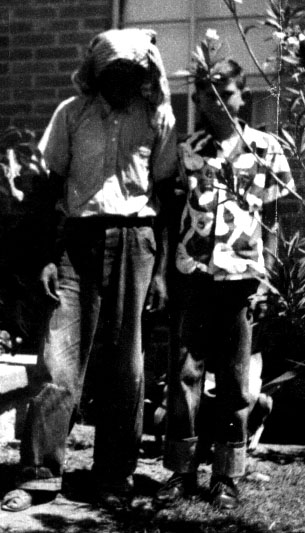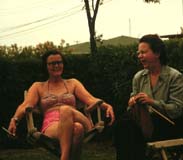|
|
|
|
|
|
|
|
|
|
|
|
|
|
|
|
|
|
 |
Dhahran Diary |
|
|
|
|
|
|
|
|
|
|
|
|
 |
|
|
|
|
|
Title: The Volunteer
DD08 |
|
|
|
|
|
|
|
|
|
|
|
|
1049-A
in 1952. The volunteer is the Acacia in
the left edge of the photograph. An almond tree adorns the other side
of the yard. (rcc) |
|
|
|
|
|
|
|
|
When
we moved into 1047, a portable on Dhahran's east side near the head
of seventh street, we were on the edge of the desert. The town had
several areas and they were named with humor intended: Skunk Hollow,
the Flats, Whiskey Gulch, Easter Egg Row, etc. Someone told me we
lived in Skunk Hollow. There was no camp perimeter fence then and
the Arab Police station was just behind our house to the north. Their
marching band (percussion and symbols) used our oily street to practice
and we would sit on the stair stoop and watch them in the late afternoon.
Workers poured the sidewalk on one of those days and as we watched
the band, the finisher pressed my sister's feet into the wet cement
and neatly printed her initials, JKC, and the date. |
 |
|
|
|
|
|
1049-A
in 1983. The streets are better, the hedges
higher, and I was able to find my sister's sidewalk footprints tucked
beneath a hedge to the left. (cac) |
|
|
|
In
1950, we moved next door to 1049-A. The Redmans were on the other
side in B. Shirley Hall’s folks moved into 1047 and John Horn
moved in on the corner at 1045. No two places in camp had the same
number so when someone asked where you lived, you didn’t say
the street. Stevie Furman lived at 1151-B, for example. Our telephone
number was four digits! We started with a woven barasti (stripped
palm frond) fence; the grass was plugged and began to spread. Dad
took down the front fence and sculpted a swooping privet hedge; he
trimmed that. I did the lawn and trimmed the side hedge until we hired
a gardener. |
|
|
 |
|
|
|
|
|
|
|
|
|
|
|
|
|
|
In
the front corner, where the hedge shared the corner with 1047, I noticed
a small vine sticking above the hedge one day while I was mowing.
The leaves were different from the privet. I searched into the hedge
and found the trail down to the ground. It was actually several tendrils
and they were twisted about one another. I showed it to Dad and over
the years we watched the volunteer Acacia grow to become a 30-foot
sentinel. It was a kind of landmark on our street because none of
the trees grew close enough to the sidewalk to provide shade. It was
eventually the biggest tree on the block. During shamaals it would
bend to the south and whip like laundry on the line. It shaded both
yards and the sidewalk. Pedestrians used to pause beneath it on hot
days. |
|
|
|
|
|
 |
Melitza
and Johnnie Rusher enjoy shade from the
volunteer, the trunk of which can be seen behind them. (rcc) |
|
|
|
|
|
Abdulla
was our first and only gardner. He was quiet and we talked mostly
with hand signs. He got a better job with ARAMCO or a contractor.
(rcc) |
|
|
|
|
|
|
|
|
|
When I returned to Dhahran in 1982, I went right to 1049-A. The
hedges were tall, untrimmed, and the Acacia was gone! A driveway
covered its resting place. Ten forty-seven wasn't the same either;
it was still a portable but of a different kind, and the property
line between the two homes had been adjusted. The sidewalk was
badly spalled except where the hedge overlapped the concrete.
I pushed the base of the hedge back in several places and finally
found my sister's tiny prints. They are final testimony to families
who had gone before and days that had gone by. I made a rubbing
and later sent it to her.
I walked around the back by going to the alley at the end of the
street. My fort was gone. I’d had it for years and finally we
ended up keeping my bike and yard stuff in it. It was made from
wooden packing crates in which our personal effects shipment arrived.
Dad helped me with the basic structure. The siding was up to me.
There were a few places that never got sided. I preferred to think
of those as windows.
There was a clothes line in back and it reminded me of how Mom
always had to watch out when her underwear was drying. The laborers
used to steal anything pretty like that, probably to take home
to their ladies. As I looked under the clothes line, I noticed
a full crop of grass. At one time no grass grew because we had
a gas line leak and it somehow upset the balance and probably
poisoned the earth. We complained for over a year and finally
someone with laborers came and dug up the ground. We could smell
the gas odor strongly. About the time they uncovered the pipe,
it was time for lunch and they all left to eat and have a nap.
When they came back, the ries-kabir lit a rolled up paper and
tried to find the source of the leak. He jumped down into the
ditch and there was a big harummpf! The gas ignited and he came out of that hole fast, without eyebrows
or lashes. Luckily he had a hat on.
Funny what you remember about the house you grew up in. It was
a great house; I lived in it for eight years including the time
I called it home while away at ACS (Beirut) and ANA (Carlsbad,
CA). |
|
|
|
|
|
 |
|
|
|
|
|
|
|
|
|
|
|
|
|
|
|
|
|
Copyright ©1999-2006
Rolf A. Christophersen
All Rights Reserved.
Email
|
|
|
|
|
|
|